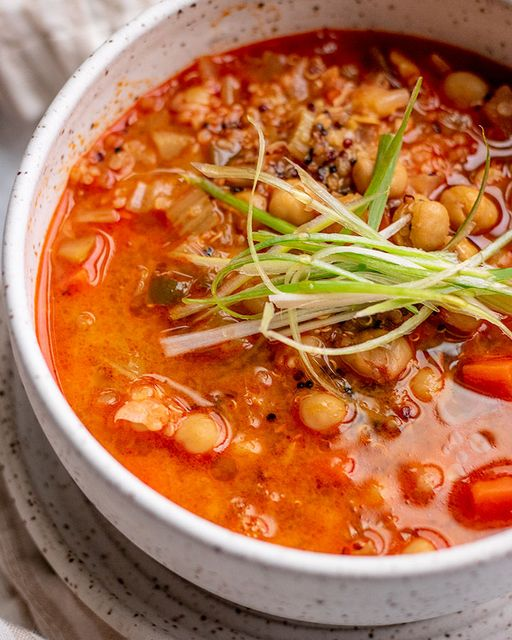Gochujang Chickpea Soup, a delightful fusion of Korean and Mediterranean flavors, promises to tantalize your taste buds with its rich and savory profile. This innovative soup seamlessly combines the bold, spicy kick of gochujang, a traditional Korean red pepper paste, with the nutty undertones of chickpeas, creating a unique and comforting culinary experience. As you delve into each spoonful, you’ll embark on a journey that marries the vibrant spices of Korean cuisine with the wholesome heartiness of chickpeas, resulting in a dish that is both comforting and exotic.
The base of this soup is a savory broth infused with the umami goodness of gochujang, lending it a robust and complex flavor profile. The chili paste not only provides a gentle heat but also imparts a depth of character that elevates the entire dish. As the chickpeas simmer in this flavorful broth, they absorb the essence of the gochujang, creating a harmonious blend that celebrates the best of both culinary worlds.
The marriage of chickpeas and gochujang is not only a testament to the versatility of global cuisines but also a celebration of health and nutrition. Chickpeas, known for their high protein and fiber content, add a hearty and satisfying element to the soup, making it not just a treat for your taste buds but also a nourishing choice for your well-being.
In addition to its nutritional prowess, Gochujang Chickpea Soup is a celebration of culinary creativity, showcasing how different cultures can come together to create a harmonious and delicious dish. This soup serves as a testament to the beauty of cross-cultural pollination in the culinary world, breaking down barriers and inviting everyone to savor the best of both Korean and Mediterranean culinary traditions.
Whether you’re a fan of Korean cuisine, a lover of hearty soups, or someone seeking a new and exciting flavor experience, Gochujang Chickpea Soup is sure to leave a lasting impression. So, grab your spoon and prepare to be transported to a world where the warmth of chickpeas meets the bold embrace of gochujang, creating a symphony of flavors that will linger on your palate long after the last spoonful.
Gut Health:
Plant-based diets are often associated with improved gut health due to the high fiber content from fruits, vegetables, and whole grains. A healthy gut microbiome is linked to better digestion and overall well-being.
Anti-Inflammatory Properties:
Many plant-based foods have anti-inflammatory properties, which can help in reducing inflammation in the body. Chronic inflammation is associated with various health issues, and a vegan diet may contribute to its prevention.
Sports Performance:
Contrary to the misconception that vegan diets lack protein, many successful athletes follow plant-based diets to enhance their performance. Plant-based proteins can support muscle building and recovery.
Reduced Risk of Foodborne Illnesses:
Plant-based diets eliminate the risk of foodborne illnesses associated with the consumption of undercooked or contaminated animal products.
Economic Impact:
A vegan diet can be more economical as plant-based protein sources tend to be cost-effective compared to some animal products. It may be a budget-friendly option for individuals or families.
Mindful Eating:
Adopting a vegan lifestyle often promotes mindful eating. Being more conscious of food choices and sources can lead to a healthier relationship with food and a greater appreciation for the environmental impact of dietary decisions.
Preservation of Biodiversity:
The expansion of animal agriculture often leads to habitat destruction and loss of biodiversity. Choosing a vegan diet supports the preservation of ecosystems and the protection of various species.
Culinary Diversity:
Veganism introduces individuals to a diverse range of cuisines and ingredients from around the world. Exploring plant-based cooking can be a culinary adventure, embracing flavors and techniques from different cultures.
Reduced Antibiotic Resistance:
The use of antibiotics in animal farming contributes to the rise of antibiotic-resistant bacteria. Opting for a vegan diet can be a way to reduce the demand for such practices and promote responsible antibiotic use.
Cruelty-Free Beauty and Personal Care:
Veganism extends to beauty and personal care products. Choosing cruelty-free, vegan alternatives ensures that your lifestyle aligns with ethical choices beyond just dietary preferences
Gochujang Chickpea Soup

Ingredients
- 1/2 tablespoon of avocado oil
- 1 small onion
- 1 carrot, chopped
- 2 stalks celery, chopped
- 1 jalapeno pepper, stem and seeds removed and finely chopped (or use 1/2 bell pepper for less heat)
- 3 cloves of garlic, crushed or grated
- 1/2 inch ginger, grated
- 1 tablespoon of gochujang
- 1. 15 ounces canned chickpeas, rinsed and drained
- 1/2 cup quinoa, rinsed well
- 1/2 teaspoon ground coriander
- 1/4 teaspoon dried thyme or 5 sprigs of fresh thyme, leaves detached
- 2 1/2 cups quality vegetable stock (or 1 vegan chicken bouillon cube with 2 1/2 cups water)
- 1 teaspoon white or yellow miso paste
- 2 teaspoons of sesame oil
- green onions to garnish
Instructions
- Heat a small saucepan or saucepan over medium heat, then add the avocado oil to heat. Add the onion, carrot, celery, and jalapeno with a pinch of salt and sauté until the onions are soft.
- Add the garlic and ginger, then sauté until fragrant again, then add the gochujang and sauté for 1 minute.
- Add the chickpeas, quinoa, coriander and thyme and add the broth. Bring the pot to a boil, then turn to low heat and simmer for 15 minutes with the lid partially closed.
- Combine the miso paste with 2 tablespoons of water and whisk until there are no lumps. After the soup is cooked, remove it from the heat and mix the miso mixture with the sesame oil. Adjust the salt according to your taste and serve garnished with parsley.
